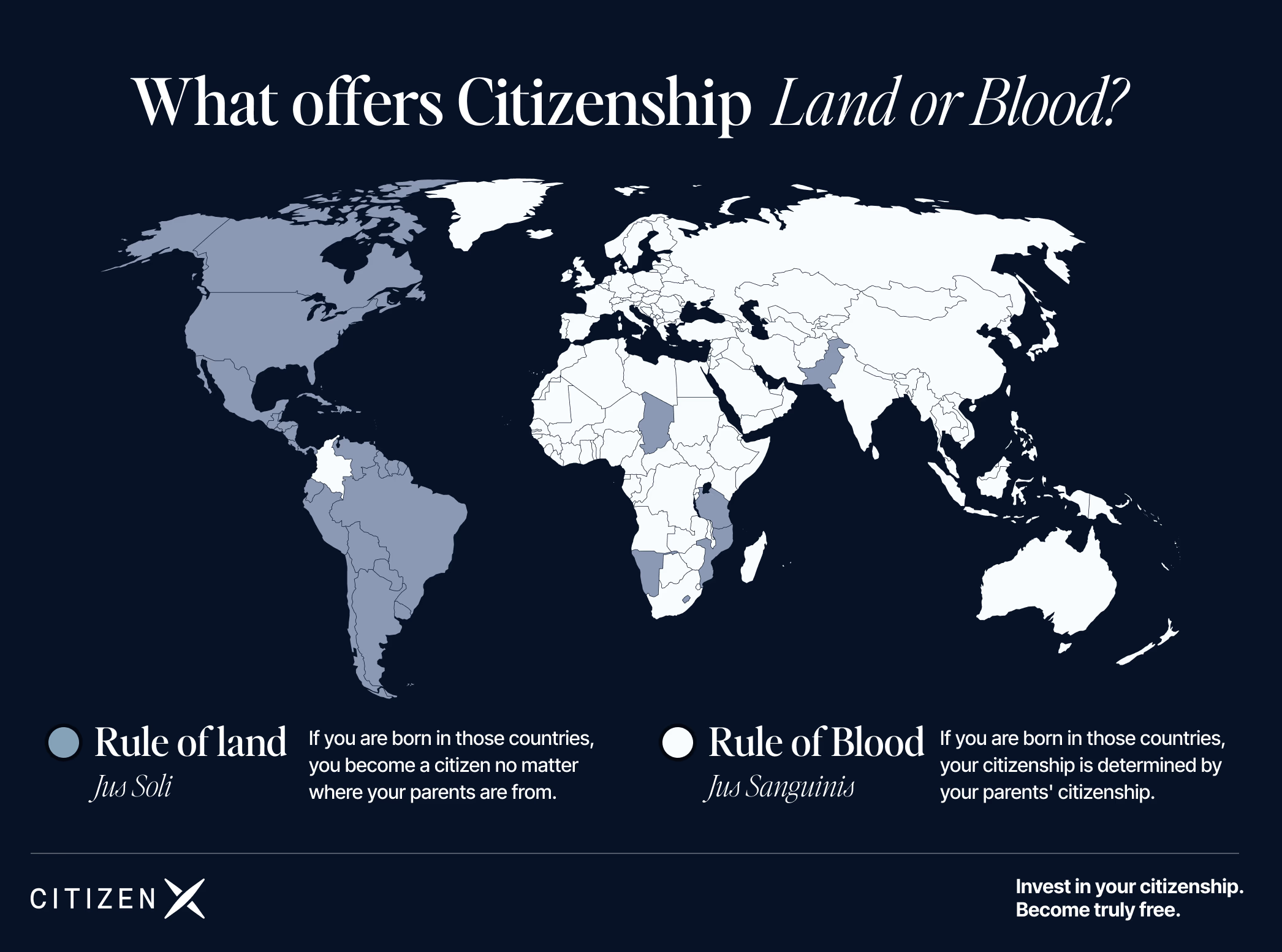Ambitions for international mobility and security can lead many global investors and high-net-worth individuals to explore the intricacies of citizenship.
For those seeking to expand their citizenship expertise, this comprehensive guide illuminates the path toward understanding the complexities of citizenship.
Whether rooted in economic prosperity, familial legacy, or the pursuit of broader horizons, the concept of citizenship extends far beyond borders and holds significant implications on the global stage.
What is citizenship?
Citizenship, in its essence, represents a legal bond between an individual and a nation, granting the citizen a set of rights and responsibilities unique to that country.
This bond not only affirms the individual's right to live, work, and own property within the nation's boundaries but also encompasses the obligation to adhere to the laws and contribute to the community's welfare.
Far from a mere administrative status, citizenship is a foundational pillar of identity, offering individuals the security of belonging, a voice in the democratic process, and protection under the country's diplomatic umbrella when abroad.
It is a multifaceted concept, intertwined with notions of cultural identity, economic opportunity, and global mobility, making it a key consideration for investors and individuals aiming to extend their influence and safeguard their legacy on the international stage.
What is a passport, and how is it related to citizenship?
A passport is essentially a travel document issued by a country's government that certifies the identity and nationality of its holder primarily for the purpose of international travel.
It serves as a symbol of citizenship, embodying the relationship between an individual and their nation.
While citizenship represents one's legal status, rights, and obligations within a country, a passport acts as a tangible manifestation of that citizenship, enabling the bearer to move across borders with the assurance of legal protection and the right to return to their home country.
The issuance of a passport is one of the most practical benefits of citizenship, not just facilitating global mobility but also ensuring access to consular services abroad, further reinforcing the significance of citizenship for global investors and high net worth individuals in securing their freedom and safety on a worldwide scale.
In this context, the passport not only affirms an individual's right to travel but also amplifies their global access and opportunities, making it an indispensable asset in the arsenal of anyone looking to transcend geographical limitations and embrace a truly international lifestyle.
What is Dual Citizenship?
Dual citizenship allows an individual to hold citizenship in two countries simultaneously, granting them the rights and obligations of both.
This status not only broadens personal and professional freedom but also provides added security and opportunity.
For global investors and high-net-worth individuals, dual citizenship offers unmatched international mobility, access to various markets, and the ability to benefit from different legal and tax systems. It serves as a strategic tool in navigating global diplomacy and economic investment, offering a safety net against geopolitical and financial changes. More than just making travel easier, dual citizenship reflects a deep commitment to multiple cultural identities, enriching one’s engagement with the world.
Dual Citizenship Restrictions
While the benefits of dual citizenship are vast, it's important to recognize that not all countries view dual citizenship in the same light.
In fact, some nations impose restrictions or outright prohibitions on holding dual citizenship, reflecting diverse legal, cultural, and political landscapes.
These restrictions can stem from concerns about national loyalty, security, or the complexities of international law. For individuals exploring dual citizenship as a means to expand their global reach and capabilities, understanding the specific stance of each country on this matter is crucial.
Navigating these legal intricacies requires diligent research and accurate information sources to ensure compliance and avoid jeopardizing one’s legal status in either country.
Renouncing Citizenship
While dual citizenship offers expanded opportunities, there are occasions when renouncing one's citizenship becomes necessary, either for legal, ideological, or merely practical considerations.
Understanding the process and implications of renouncing citizenship is pivotal, especially when considering the stateless condition or the financial implications, such as exit taxes, that may arise from such decisions.
Stateless: Can I have no citizenship?
The status of statelessness is as an undesirable condition, often associated with significant limitations and lack of access to vital services and protections. International organizations, such as the UNHCR, emphasize the importance of preventing and reducing statelessness, underscoring the right of every person to acquire citizenship. This is why dual citizenship is often a pre-requisite to renouncing any citizenship.
What is an Exit Tax?
An exit tax is a fiscal charge levied by some countries on individuals who decide to relinquish their citizenship or permanent residency, essentially taxing the capital gains on their assets as if they were sold on the day of their departure.
This tax reflects an attempt by countries to claim revenue on the unrealized gains of individuals moving their tax base outside of the country's jurisdiction.
The implications of an exit tax are profoundly influenced by one's citizenship and residency status, as these factors determine tax obligations to a country.
Citizens of countries that impose taxes based on citizenship, such as the United States, may find themselves subject to exit taxes when renouncing their citizenship, regardless of where they reside.
Conversely, individuals who are residents but not citizens of a country imposing exit taxes based on residency will also need to consider the financial consequences of changing their residency status.
In this context, understanding the nuanced interplay between citizenship, residency, and tax obligations is crucial for anyone contemplating significant changes to their domicile or nationality. This ensures that individuals can make informed decisions, optimizing their financial and legal positions while complying with the complex web of international tax laws.
Citizenship vs Residency
Residency, in contrast to citizenship, refers to an individual's right to live in a particular country for a specified period, which may be temporary or permanent.
Unlike citizenship, which is a permanent legal status implicating a mutual relationship between an individual and their country, residency focuses on where an individual lives or intends to live.
Residents are subject to the laws and regulations of their host country but do not enjoy the full scope of rights and privileges afforded to citizens, such as the right to vote or hold public office.
The Key Differences Between Citizenship and Residency
The distinction between citizenship and residency is paramount in understanding one’s legal rights, obligations, and the depth of their relationship with a country.
Citizenship is an inherent right that includes full participation in the political process of a country, as well as obligations to that country, which may include military service or jury duty. It also provides a guarantee of support from the country’s consular services when abroad.
On the other hand, residency allows an individual to live, work, and study in a country for a certain period but with limited political rights and often contingent on certain conditions, such as employment or investment.
Governance Rights
Citizenship is the ultimate form of membership in a country, entailing full political and civil rights. In contrast, residency offers the right to live and work within a specific country, but without the voting privileges or access to certain social benefits reserved for citizens.
Furthermore, the rights to social services, educational benefits, and health care may differ substantially between residents and citizens, with citizens enjoying more comprehensive access and protections.
Mobility Rights of Passport vs Residency
Possessing a passport as a citizen grants the freedom to travel and reside in other countries visa-free or with a visa-on-arrival privilege.
Residency permits, though valuable, do not carry the same global mobility advantages and may entail more localized access to specific countries.
Revocability
While residency can often be a pathway to citizenship through naturalization processes, it is inherently less secure, as it can be revoked under certain conditions, such as extended absences from the country or the commission of serious crimes.
Citizenship, once acquired, offers a more stable legal status with less susceptibility to revocation based on economic or employment criteria.
Family Rights
Another critical aspect is the ability to pass down citizenship to one's children. Unlike residency, citizenship offers the possibility for generational transmission, securing the familial line with the privileges and responsibilities associated with citizenship.
Acquiring Citizenship
Citizenship by Birth
Two main principles govern the acquisition of citizenship by birth: jus soli (right of the soil) and jus sanguinis (right of blood).
While some countries confer citizenship based on the location where a person is born, others follow the principle that a child acquires citizenship from their parents, regardless of birthplace.

Citizenship by Descent
For individuals with familial roots in a particular country, the process of acquiring citizenship through descent follows clear lineage criteria, usually involving parents or grandparents who were citizens at the time of the person's birth.
Citizenship by Naturalization
Often a rigorous process, citizenship by naturalization involves statutory requirements, including language proficiency, integration into the local community, and a period of residency before the application can be considered.
Citizenship by Exception
Some countries offer unique pathways to citizenship, bypassing traditional naturalization processes, to individuals who demonstrate exceptional economic, cultural, or scientific contributions.
Citizenship by Investment (CBI)
For the modern investor, the concept of financial citizenship opens doors to global mobility and security. Citizenship by investment (CBI) programs afford individuals the opportunity to acquire citizenship in a country by making an exceptional investment, thus propelling economic development and expanding the nation's global network.
What is Citizenship by Investment?
Citizenship by investment (also known by its acronym CBI) is a process where an individual makes a significant financial contribution, typically through a donation, purchase of real estate, or investment in a government fund in exchange for citizenship and a second passport.
Benefits of Economic citizenship
The advantages of CBI programs are multifold, offering investors and their families a high level of personal security, business opportunities, ease of travel, and access to world-class education and healthcare.
The Rise of Golden Passports
With the rise of globalization, several countries have introduced CBI programs, often termed "golden passport" initiatives, that cater to the unique needs and aims of international investors, attracting a diverse spectrum of applicants.
What is a Golden Visa?
A golden visa is a type of residency by investment (RBI) program that gives a permanent residence permit to foreign investors who fulfill specific investment requirements and provides a clear pathway to citizenship.
Similarities and Differences with CBI
While similar in their goal of satisfying economic investment to attain a form of legal status in a country, golden visas differ significantly from CBI in terms of the rights and status they confer, particularly the absence of immediate citizenship acquisition. Golden Visas carry significant presence requirements to get citizenship, while Golden Passports offer a path to citizenship with little to no presence in the country.
Choosing the Right Path
Navigating the decision between pursuing a golden visa or golden passport program is dependent on individual objectives, future plans, and preference for long-term residency versus immediate citizenship.
In summary, we hope this document has provided you with a clearer understanding of the intricate tapestry that citizenship represents in today's global landscape.
From the fundamental rights and responsibilities that accompany citizenship to the strategic advantages of citizenship by investment and residency by investment programs, there are myriad pathways for individuals seeking to expand their global footprint and secure a prosperous future for themselves and their families.
Whether you're drawn to the enhanced mobility, security, or economic opportunities that come with a second passport or residency, the importance of making informed, strategic decisions cannot be overstated.
We encourage you to explore citizenship diversification options with CitizenX, where our team is ready to guide you toward making the choices that best align with your long-term personal and professional goals.
Together, we can open doors to new opportunities and secure your legacy in an increasingly uncertain world.




